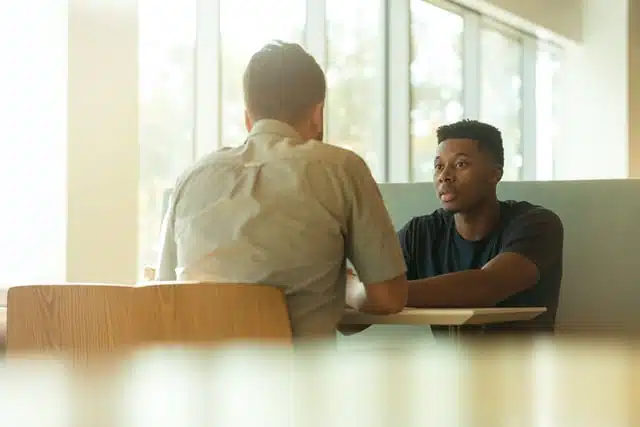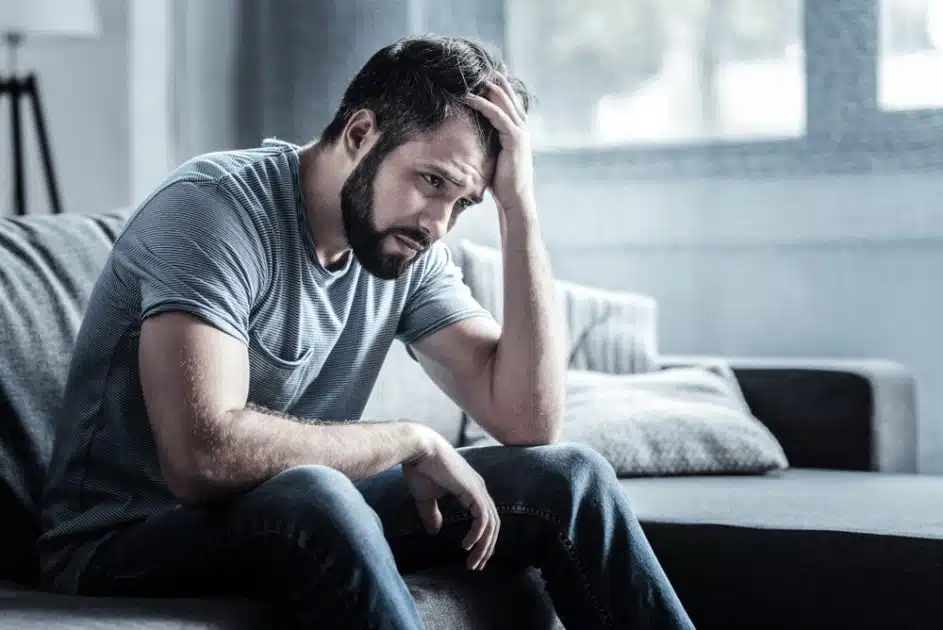Couples Therapy Explained and 7 Reasons it Might Save your Relationship

What is couples therapy
What is Therapy? 03rd Feb, 2022
What is couples therapy?
Couples therapy or couple therapy is a type of therapy designed for couples to assist in navigating and solving problems as a team. It can help you and your partner maintain a romantic connection by resolving a myriad of interpersonal conflicts.

Although some may see a relationship therapist as preventative, most couples leave seeing a relationship therapist until things go wrong.
Either way, a relationship therapist helps couples deal with complex situations within a relationship.
A trained couples’ therapist will help to give you new skills to deal with current and future problems effectively and amicably so that your relationship remains strong and can stand the test of time.
Forms of this therapy include marriage counselling and family therapy and is usually a short term therapy but can take longer when needed.
5 Facts about couples therapy and marriage counselling
Although couples’ therapy will definitely help in many situations, it is not an overnight miracle solution. Here are some facts about couples’ therapy but also equally attribuate to marriage counselling
1. You Are Not a Client
The couple is the client. Most couple therapists have what they call a “no secret rule.” This means that whatever you share with the therapist will also be shared with your partner.
For example, you cannot reveal an affair to your therapist and expect it to be hidden from your partner.
Also, don’t expect your partner to be the centre of treatment. This is about the two of you as a whole, not about you as individuals.
2. If you don’t get over your issues now, they will stay with you
Even if we leave the relationship, we can’t leave our luggage behind. No matter where we go, it will follow us until we figure it out. Maybe it’s trust issues, maybe it’s something else.
If you don’t do this, you will likely repeat the same unhealthy behaviour and follow the same pattern in the next relationship.
3. Therapy takes as long as it takes
Many couples are short-sighted and expect treatment to take effect overnight. Just as it takes a while for a relationship to deteriorate, it also takes time to get it back on track. The exact number of treatment sessions depends entirely on the therapist’s method, the work you are both willing to put in and where you both started from.
On average, you can expect to spend five to six months of treatment to make a couple feel ready to stop receiving therapy.
4. Your Therapist wont just tell you how to fix everything
You may already know that a therapist cannot tell you what to do. Instead, they try to guide you in your path to fixing your relationship. Most couples know that their fights are meaningless, harmful, and useless, but this does not stop them from arguing. Likewise, the therapist is not a referee. He/she can’t decide which of you is right or wrong.
Your job is to identify the harmful patterns in which you and your partner participate, then work together to change those patterns. It is vital to respond with kindness instead of a fight. It is fundamental to open your heart to feelings in therapy instead of building a wall around it.
Any stressor or obstacle that recurs in the relationship is a model that can be resolved.
5. Happy couples can also go to treatment
You don’t need to wait until it’s about to break up to attend therapy. Going to therapy when things are going well seems weird, as we generally consider therapy as the last straw.
It is, however, an excellent preventive method to avoid future problems. If you haven’t tried it, then it is time to start. Don’t wait until it is too late.
What are the types of couples therapy?
Most Common Types Of Couples’ Therapy Include:
- Emotionally focused therapy (EFT): Dr. Sue Johnson, the author of Hold Me Tight, popularised EFT, which focuses on the premise that couples must build an “attachment bond” – a sense of emotional safety with each other.
An EFT therapist will work with you to identify your individual dynamic requirements and how your partner may help you meet them. - Gottman method: The Gottman Method is based on Dr. John Gottman’s famous book, The 7 Principles of Making Marriage Work. The basic idea is that unresolved conflicts are inevitable, and couples must try to handle them through positive communication.
Couples should never try the “four horsemen”: criticism, contempt, defensiveness, and stonewalling.
As you might expect, this sort of therapy is more open-ended and less organised, which may be beneficial for people who find other formulas too strict. - Cognitive behavioral therapy (CBT): Also referred to as cognitive behavioral therapy.
(CBT) tries to change thought patterns, so that when interactions would usually go towards a negative direction they can instead become resolved. - Ellen Wachtel’s approach: This aprroach asks for self awareness and reflection, looking towards the strengths of the realtionship rather than creating a tally of who is more to blame.
- Psychodynamic couple’s therapy: Psychodynamic therapy aks what are the hopes and fears that motivate you and your partner.
So that with greater understanding of how you both tick you can both more forward with more empathy and understanding. - Behavioral therapy: Also known as behavioral couples therapy (BCT), this is the Pavlov equivelant to couples therapy. You are reinforced for wanted or good beahviours and disuaded from unwanted or destructive ones.
Many counsellors have received training in many types of therapy and will personalise your treatment to your specific needs.
The Gottman Method and Emotionally Focused Therapy (or EFT) are the most common and well-established techniques of couple’s psychotherapy.
Couples Therapy Techniques
Couples therapists often employ a varied or intergrated approach, borrowing techniques from different forms of therapy and merging them to try and fit you.
Here are some common strategies a couples therapist might try:
- Learning who you both are: As expected, a therapist needs to know exactly who they are dealing with before suggesting the right techniques to try.
By getting to know you, they are better able to know your problems and what is still holding you both together. - Focusing on solutions: A therapist should help you to move away from a problem fixated or blame centric mindset and instead more towards a “what can we do to make things better” approach.
- Learn new skills: Couples therapy can help teach and equip you and your partner with new tools and better problem solving so that when problems arise you are better handled to deal with them.
- Idetify Feelings: We carry feelings with us all the time that we struggle to put into words, a therapist will help us to do that and give us the time to express how we really feel.
- Exploring the past: Couples therapy will look to the past but usually not to dredge up old conflicts but instead to find patterns and the underlying cause of them.
In this way you learn from the past rather than just dwell on it.
Do I need couples therapy? 7 common reasons now is the right time

You May Need Marriage Therapy When:
1. There Has Been A Breach Of Trust
The need for assistance in resolving a significant breach of confidence is one of the most common explanations for marriage therapy.
Perhaps it was sex infidelity; maybe it was an emotional affair; perhaps it was a series of financial lies or deceit. Creating a safe space will also assist in the restoration of the base of trust.
2. Conflicts Are Becoming More Common
Perhaps they’re just “minor” disputes, or maybe the blowouts are massive and leave a trail of drama in their wake. In any case, it’s the pattern of the increase that matters.
Perhaps it’s just a blip on the screen. It may also, however, point to a potentially dangerous path of endless bickering. More importantly, it may mean serious issues lurking underneath the surface.
3. The Level Of Communication Is Inadequate
Perhaps there is no direct dispute, but you are continually misunderstood or overlooked. Maybe you don’t have a clear understanding of what’s going on emotionally with your partner lately.
An increase in intimacy and a significant change in its efficiency is often one of the most visible results of couples’ therapy. Regularly, marriage therapy through a professional counselor will provide you with resources to help you communicate, hear, and understand each other much better.
Disagreements about parenting, marriage, money, lifestyle, in-laws, and other family members are common topics in couples therapy.
It’s all too tempting to get caught up in your own thoughts and emotions when you’re in a relationship. The more you argue about something, the more you’ll find yourself in a vicious circle of confrontation.
Couple therapy can help in this kind of situation. The counselor serves as a moderator, assisting you in seeing all sides of the argument. They don’t give you instructions.
They simply assist you in exploring your emotions in a secure and calm environment. This helps you recognise the underlying issues that are causing your problems and hearing each other for the first time to see new paths forward.
4. Something Doesn’t Feel Right, But You Don’t Know What Or Why
Marriage counselling or couples therapy can be helpful not just for fixing problems but also for finding them. Let’s say something in your marriage’s dynamic has shifted, but you can’t quite put your finger on it. Alternatively, you could not feel as at ease with your partner as you once did.
These are frequently early warning signs that a relationship is becoming unhealthy or unstable. It doesn’t mean that one person is at fault; instead, the relationship as a whole could use some work.
5. You’re Having Problems With Sex and Intimacy
A different libido, lack of confidence, getting trapped in a routine, and a partner questioning his/her orientation are examples of sex and intimacy issues. It’s easy to conclude that something like this shouldn’t be enough to end a relationship.
However, the stress created by not discussing sex and intimacy issues can lead to other conflicts or leave one partner feeling bitter or neglected. Issues with sex and intimacy are often a symptom, not a cause. A therapist can assist you in examining the emotions that might be the root of your problems in the bedroom.
6. You’ve Been Through Something Traumatic That Has Altered The Way You Interact With One Another
There are many life events that can devastate a relationship. Long-term unemployment, a health problem, or strife within one of the partner’s ancestral families are all possibilities.
You might not consider marriage therapy in the aftermath of such a significant event; after all, you do have plenty to worry about. Keeping your relationship’s bond strong will help you and your partner stay together.
Retirement, moving around the world, a midlife crisis, children leaving home, and health problems are common issues in couples therapy.
When one person’s life changes but not the other’s, it may seem as though you’re suddenly living different lives. Even if you both notice the difference, your reactions to it will differ.
Judgments and disagreement will arise, and you can find yourself drifting apart. One partner may also blame the other for the change.
A couple’s counselor will assist you in expressing your concerns about the transition. He/she will assist you in posing good questions to yourself about what is going on. This could lead to new insights and paths forward that you wouldn’t have seen otherwise.
7. You Feel Like You’re Trapped In A Routine
The number of habits that couples create in day-to-day life is endless, but not all habits are healthy. A dysfunctional and unsatisfying practice can be dangerous for any relationship.
These habits can be simple or complex. If you think you are stuck in a routine that you don’t like, try changing things. Bear in mind that the longer a trend persists, the more resources and time it will take to break it.
There are many kinds of therapy that may help in a variety of circumstances.
Pro Tips from Couples therapists
Here are some of the very best tips from couples therapists:
1. Focus on the patterns not the moments
Couples usually fight over the same thing, time after time. The couple unconsciously repeats the old pattern to hold on to the familiar things, while at the same time, hope that this time the situation will be different and be free from the pain.
Once you start to see and understand this pattern, there will be natural healing and growth opportunities in your relationship. It is advisable to build a strong bond with your partner. But this will not happen in a dramatic crescendo like in movies.
2. Prioritise Your Intimacy
Here are some of the very best pro tips from couples therapists:
1. he terms “intimacy” and “proximity” are often used interchangeably, but they are pretty different. Proximity means comfort. This is low-risk, low-fear, predictable, and familiar.
Proximity is necessary for all relationships, but proximity without intimacy is just staying halfway into creating a better commitment. Intimacy is about adventure, novelty, unpredictability, and spontaneity.
Intimacy means you have a close and sensual relationship with your partner. Proximity means you have a relationship with the idea or concept of your partner.
3. Compassion Comes First
Couples will inevitably have differences and sometimes even cause each other pain inadvertently. In this case, it is essential to remember that the important thing is not to break but to repair.
Learning to approach each other with empathy and compassion can help couples overcome any temporary loss of contact and strengthen the relationship.
The process of keeping close to your partner and working to truly repair the relationship are great ways to rebuild bridges that can enhance the relationship in the long run.
4. You Can Always Cut Your Partner Some Slack
If there is one thing that makes a successful couple relationship different, each partner can support the other. Support allows us to accept ourselves and our partners.
It will enable us to go beyond the bad outcomes and understand that people are imperfect. Although this may be taken for granted by some, it can also be learned by many. Instead of criticising your partner harshly, simply try to get in their shoes to understand their motives.
5. Prioritise Yourself For a Better Sex Life
Many couples have had a higher level of sexual interest and arousal towards their partners in the past. They usually worry that they feel very wrong because they do not feel the same anymore.
One of the most important aspects of restoring sex is to make time for it. Give yourself a chance to rest and practice romantic sex. Although the goal of most people is to have more sexual intimacy with their partner, this can only be achieved by paying more attention to having sex.
Part of this involves actively aligning oneself with the needs and desires of the body and cultivating personal comfort and acceptance of the body.
Losing sexual interest is a common thing in every relationship. Knowing how to deal with this can be challenging. But it is normal. You only need to learn how to deal with it.
Same sex couples therapy
Is therapy different for gay couples?
Couples’ therapy is suitable for all types of relationships, heterosexual or homosexual couples. Like heterosexual couples, same-sex relationships can experience difficult times. As long as their relationship requires, they can use same-sex couples therapy.
Heterosexual and same-sex couples have a lot in common, but they are not exactly the same. Both types of relationships have money, sexual, and abuse problems, however, same-sex relationships also face their own challenges that not many heterosexual couples face frequently.
Here are some of them:
Gender Roles Play a Significant Role In Same-Sex Couples
There are traditional gender roles in every relationship. These assume that women are relational and men are somewhat basic. These gender-related assumptions have some scientific foundations which can be used to understand same-sex couples.
For instance, the feminine side of the relationship has the tendency to adapt to the needs of the other partner, and try to solve the problems between them. On the other hand, the masculine side usually reflects ability, independence, and lack of emotion in the context of a relationship.
When problems arise, the male side tends to let the situation worsen. Gay male couples tend to rely on social communication, rather than emotional factors, for mutual satisfaction.
When at least one member adopts a rigid male role, difficulties may arise in the relationship. Most common examples are the use of distancing strategies, high competition, and strong control needs.
Having Different Stages In Terms Of Gay Identity Growth
Generally speaking, it takes several years for an individual to realise same-sex attraction before accepting their sexual orientation. Often, same-sex couples are individually at different stages of this realisation process. Many enter into a same-sex relationship prior to completing their journey.
This can be a problem, as it forces partners to focus on developing their personal sexual orientation while facing the challenges of a relationship.
Being in different stages often leads to conflicts between the partners regarding acceptable openness in family relationships, employment, community, and friendship. Many relationships can overcome this conflict, but some relationships cannot.
A Therapist Will Evaluate The Environment Of The Relationship Based On Factors Like
- The level of development of each partner
- External issues such as support or alienation from family, community, workplace, and friendships
- Presence of mental, physical, or domestic illness
- Violence, history or current
- HIV problems
- Problems in intimacy
Gay and Lesbian issues are usually handled differently because each has specific life stressors that can significantly impact male partners more than female partners, and vice versa.
Lesbians, for example, tend to be more anxious than gays about family member reactions, while gay men tend to be under greater pressure from HIV/AIDS, violence, and harassment discussions. Either way, a therapist is fully prepared to handle the situations that may arise.
For these reasons and others you may wish to find a therapist who really gets you. Some gay couples would rather just find an LGBTQ therapist themselves, as they will feel more comfortable and understood.
No matter who you find, here are 5 tips to help find the right person for the job.
1. Visit a Therapist Who Accepts Same-Sex Partners
First, choose a therapist who is willing to accept same-sex partners as clients. The important thing is to attend therapy that can make you both feel safe and comfortable.
In treating same-sex couples, empathy is an essential part of the treatment process. If the therapist finds it strange to talk about your problem, especially if it is about the sexual aspects of your relationship, then it is best to find someone else who understands and sympathises beyond a clinical capacity.
2. It Is Better To Get Referrals From Other Gay Couples
Seek referrals from other gay couples who have received couples’ counseling. Once you have a couple of choices, do research to find a professional you trust.
Make sure they have a lot of experience working with gay couples. Also, it is essential to bear in mind cultural background and price per session, and never forget to check if the therapist is certified.
3. Make Sure That Your Therapist Has Plenty Of Experience With Gay Couples
It is vital that they have updated experience with gay couples. Some therapists are a bit outdated in their ideas and methods. Those who had received training before the 2000s may still think that homosexuality is a mental illness due to their college education.
This is not always the case, but we can still find therapists that believe in this, so therefore, not all same-sex marriage counsellors are suitable. You can look around.
4. Find a Therapist Who Has Experience Treating Problems Similar To Yours
Same-sex couples often have complex relationship dynamics. Some identify as Gay or Lesbian, some are bisexual, transgender or non-binary.
Regardless of what sexual or gender you and your partner identify as, it is important to find and choose a therapist who fully understands the specific dynamics of your relationship. Take your time, and do all the research you need, to make an educated and fully considered decision. The results will depend on it.
5. When looking for an LGBTQ friendly therapist, try to use a directory that is known for being inclusive
There are plenty of great options out there now which can let you pull down preferecnes of what sex they are and also what type of same sex couples they specialsie in.
Also look out for sites that vet and verify the people on their to make sure that you find someone who can look after you and your partner.
6 Reasons why Couples Therapy Doesn’t work
Couples therapy can support relationships in a variety of ways. It can aid couples in resolving conflict, learning effective communication, better understanding each other, improving their emotional relations, and strengthening their bond.
Still, Couples therapy does not guarantee improving your relationship. Just putting your bum in the chair isn’t enough and here is why:
1. The desire for your partner to change and you to not
When people go to couples therapy, they are looking for a change. Sometimes what they want is for their partner’s actions to improve due to the counseling. They can, for example, request that the therapist alter their partner’s spending patterns.
They, on the other hand, would like to keep things the same. In couples therapy, however, the partnership is the focus of change. To strengthen the relationship, all partners must make improvements. Both must alter their attitudes and behaviours.
2. You Are Not Taking Responsibility For Your Actions
Another standard stumbling block is refusing to accept responsibility for your part in the relationship’s problems. For the therapist, couples therapy will sound like a courtroom.
This is because both partners are attempting to share their perspectives to receive validation and input from the other.
On the other hand, couples counseling is only successful if both parties recognise how they contribute to the conflict or problem and try to change their actions.
3. Too Many Secrets Not Being Shared
Some couples enter couples therapy with secrets, which they hope to keep hidden.
Couples who keep secrets from their spouse while in couple counseling are deceiving themselves and their loved ones. They are putting obstacles in the way of meaningful progress.
Consider the consequences for your relationship if you’re keeping a secret from your partner. Marriages may suffer from a lack of confidence and life as a result of secrets.
They have the potential to become thick barriers to interpersonal intimacy.
4. Failure To Follow Through
Couples will agree on what needs to change in their relationship for it to improve. Following through however, or using helpful tactics during a debate may be challenging.
Couples must learn to be cooperative with one another and work as a team to solve this challenge.
5. Not Being Confident In The Process
Couples may seek counseling in the hopes of receiving a fast fix or for the therapist to convince their partner that they need to improve. Couples must, however, trust the counseling process to strengthen their relationship.
To fix your marital dispute and begin the healing process, you and your spouse will need to devote time and commitment to learning how to be open with one another.
6. Waiting For Too Long Before Trying Therapy
Many couples use couple counseling as a last resort before consulting with a divorce counselor or going to court. These couples, on the other hand, are less likely to change their relationship.
If a dispute impacts your marriage and isn’t going anywhere, seek support as soon as possible. Waiting and wishing for it to go away isn’t a good idea. If you’re going to therapy as a last resort, you should know how important it is to have an open mind.
Couples who seek counseling late in their relationship may use therapy to weigh their options. Then, they settle any problems or even schedule a formal breakup that keeps their relationship respectful and functional.
FAQ
How to find the right therapist?
This could be the most challenging aspect. Prepare to set aside time – a few weeks, if not months – and meet with at least a few different people.
Before you begin, chat to your spouse about the type of vibe they’re looking for. Check with your friends to see if they know anyone. You could also seek advice from a reputable medical practitioner, such as your OB/GYN or primary care physician.
You may lookout for local therapist associations in some cities. Don’t be surprised if a therapist doesn’t have a significant online presence. Many good therapists get enough referrals and are busy enough without needing to market or even develop a personal website.
Finally, remember to have an open mind. Allow yourself to be surprised if you have a mental checklist of what you think a good therapist looks like. You don’t truly understand what it’s like to be in a room with someone unless you’re there, speaking with them. You must both feel at ease and respected.
How much is marriage counselling?
The average cost of marriage counseling or couples therapy can be from $75 to $150/hour in the US and can be from £10 to £70 in the uk. However even then the prices can range as high as $200 – $300/hour depending on who is providing the therapy.
Changes to the cost can depend on where you live, if your therapist is willing to work out a deal on a longer term basis and what type of therapy you are looking for.
Insurance will commonly not cover couples or marriage therapy, so you will usually have to pick up the bill. If you are looking for affordable couples therapy you might prefer to use online marriage counselling which is usally at a lower cost.
The other way to look at the cost of marriage counselling is the cost of divorce, which can be much higher than paying for a therapist. Ultimately the choice of whether marriage counselling is worth it is up to you.
Will my marriage therapist reccomend divorce?
Marriage therapists generally do not recommend divorce. Marriage therapists tend to believe that only relevant partners can make this moral decision. Although most therapists come across abusive relationships, they still do not recommend divorce.
They rather take the path of helping the victim break up, and seek help. The point of therapy is to find common ground and rediscover the perks of being together. Therapy is not the end of the road, instead it can be the beginning of a whole new adventure.
How to prepare for couples therapy?
Before you meet a therapist, call and inquire about their cost, background, and whether they accept insurance (most don’t, but specific insurance plans can pay you for therapy charges, or at the very least count it toward your deductible).
While you’re at it, double-check that they’re licensed! Don’t expect a free “trial”; most therapists will want you to come in and complete a formal first session, for which you will be charged.
Couples therapy is typically more expensive than individual therapy, with prices ranging upwards of $300/hour, depending on where you reside and the therapist’s experience.
What do couples do in therapy?
This type of treatment helps build a therapeutic connection with a skilled counselor during one-hour sessions that they attend together once a week for several months.
Initially, the couple will schedule a meeting with the counselor to discuss their problems, hopes, and goals for therapy and whether both partners and the counselor want to continue working together on treatment.
During therapy, both partners will have the chance to express themselves, and the counselor will provide feedback.
On occasion, the couple will have to do some homework between sessions. This could include practicing a specific form of communication or taking on certain activities that have caused problems in the past.
How to get your partner to therapy?
One or both partners may choose not to participate in relationship counseling. This could be due to a variety of factors.
The differences in background or opinion between the counselor and the couple can sometimes be too significant for the couple to feel that the counselor truly understands them.
Other times, one partner may enjoy working with the counselor while the other is less enthusiastic.
Nevertheless, couples’ counseling can be effective even if there is a motivational imbalance between the two partners. However, if one partner feels blamed and cast in the role of “bad partner,” couples counseling may feel more like a punishment than a treatment.
A counselor may opt not to provide counseling to a specific couple in some instances that have proven detrimental to the effectiveness of couples therapy.
For example, a counselor may believe the couple will make little progress if one or both partners are abusive and don’t appear to perceive it as a problem. Similarly, it occurs if one or both partners have significant addiction difficulties that they deny.
As it is critical for the couple and therapist to work together to resolve the relationship’s challenges, identifying the correct therapist for the couple should be prioritised.
What not to say in Marriage Counselling
The rule of 3 in marriage counselling is. Never to say –
1. “Don’t tell my partner this but…”
Your therapist is not there to take sides nor are they their to keep secrets between you. They are their to be a neutral force that will help guide you both towards new solutions and better patterns in your relationship.
2.”You are just wrong.”
Therapists don’t get it right all of the time, but they are their to ask questions and suggest new ideas. You have come to therapy with the idea of finding change, if you are against the idea of change then you are not getting the most out of therapy.
In fact your therapist might first spend some time working out what is behind your combativeness to change, before being able to move on to you both as a couple.
3.”That’s it, I want a divorce!”
Empty threats are not helping anyone. If you mean it, then stop therapy and just push for the divorce. But if you are there to make things better then keep your finger away from the eject button.
Being extreme with ultimatums is simply pointless and adds no value to the therapy session. Try to take control of your emotions and start verbalising what it is that is making you feel that way.
Bottom Line
Regardless of whether you are a heterosexual or homosexual couple looking for therapy, taking positive steps is going to be a good thing for your relationship. If you are willing to put in the work, do what you have to, and most importantly listen, you can turn almost any situation around.
Couples therapy can be useful for almost every couple, so if you are on the fence but think you might need it, then just take the plunge.




















